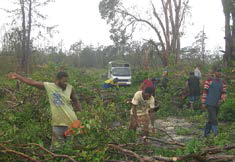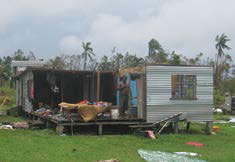It was early Sunday morning, in the wake of Tropical Cyclone Winston. No one knew the full extent of the damage it had left behind. Scattered reports were coming through the little transistor radio my mum kept for emergencies, and for the days and weeks that followed, it would prove to be an incredibly valuable device.
My first instinct was to check on our partners and friends in Kubulau— they were in the direct path of the Category 5 cyclone. There was absolutely no way to reach them. The communication towers for both phone networks in Fiji were down.
As reports started coming in from other communities and the devastation they faced, I began to worry. Did Kubulau make it? What had they lost? What did this mean for the Namena Marine Reserve and their pristine coral reefs?
CORAL is closely tied with the people and districts within Kubulau. Since 2005, we have helped develop and create an effective and sustainable community group that manages the district’s natural marine resources, the Kubulau Resource Management Committee (KRMC). As I was about to discover, the KRMC proved its worth in the wake of Winston—not only to the people of Kubulau, but also to the reefs within the Namena Marine Reserve.
Early Tuesday morning, when the cell towers were restored, I received a call from Peni Were, the coordinator for the KRMC. I was apprehensive about taking it—what could I say to someone who had potentially lost everything in the strongest cyclone to hit this side of the planet? My anxiety was quickly allayed by the decisiveness of our conversation. He spoke quickly through their harrowing experience. When I asked what they needed he sounded like he was reading off a list; pinch bars, hammers, cutters, and most urgent of all, chainsaws. He said, “Right after the cyclone, the KRMC organized all able-bodied men to begin clearing fallen trees on the roads and in the villages. In the last 24 hours, we’ve reached all accessible villages except three and have collected figures on the extent of damages.”
 In just three days, while most other communities in Fiji were still in crisis mode, this district had proactively begun their rehabilitation without outside assistance. As assessments conducted by the government’s Disaster Management Center indicated, the Kubulau district was one of the worst hit in Vanua Levu with more than 80 percent of houses destroyed.
In just three days, while most other communities in Fiji were still in crisis mode, this district had proactively begun their rehabilitation without outside assistance. As assessments conducted by the government’s Disaster Management Center indicated, the Kubulau district was one of the worst hit in Vanua Levu with more than 80 percent of houses destroyed.
The quick recovery process is a result of their strong communal, traditional and familial ties. These attributes transferred to the KRMC and together, they were able to respond and fund their immediate recovery needs.
 Kubulau suffered great losses to their iqoliqoli (traditional fishing grounds). The local fishermen had two accessible iqoliqoli, and after Winston, one of them was completely destroyed; it was all sand. Despite this, they did not have to open up their tabus (restricted fishing areas). The reef fees they collect go into a community fund and savings account. This means the communities of Kubulau had the financial resources they needed to get by and make up for lost fishing and tourism incomes.
Kubulau suffered great losses to their iqoliqoli (traditional fishing grounds). The local fishermen had two accessible iqoliqoli, and after Winston, one of them was completely destroyed; it was all sand. Despite this, they did not have to open up their tabus (restricted fishing areas). The reef fees they collect go into a community fund and savings account. This means the communities of Kubulau had the financial resources they needed to get by and make up for lost fishing and tourism incomes.
As I was about to hang up, Peni told me that Paulo Kolikata, the recipient of the 2015 CORAL Conservation Prize, wanted to speak with me.
The first thing he said was, “Isa Lisi, na nodatou vale sa yali” which means “Isa Lisi, our home is gone.” It hit me hard. In the iTaukei language, to say nodatou was to include me as a member of his home. We shared the loss. I choked back on tears as I thought of the lovely pale yellow concrete home that had billeted me just two weeks earlier.
I returned to Kubulau three weeks after Winston. It was difficult, but I did not openly cry when I saw the destruction—it served no purpose; it would not bring back what was lost. What I could do was become an amplifier, to take the data and stories I had gathered and find ways to give back. Even though the state of their environment was dire, and the pain and grief of those affected could be heard under their cheery voices, what stood out most prominently was their resilience and their determination to move on, rebuild and grow.
To note: Together, we grieved and supported our partners and friends in Kubulau. Thanks to CORAL’s generous supporters, we were able to send the KRMC more than $5,000 to buy chainsaws, gasoline and other much-needed equipment and tools.